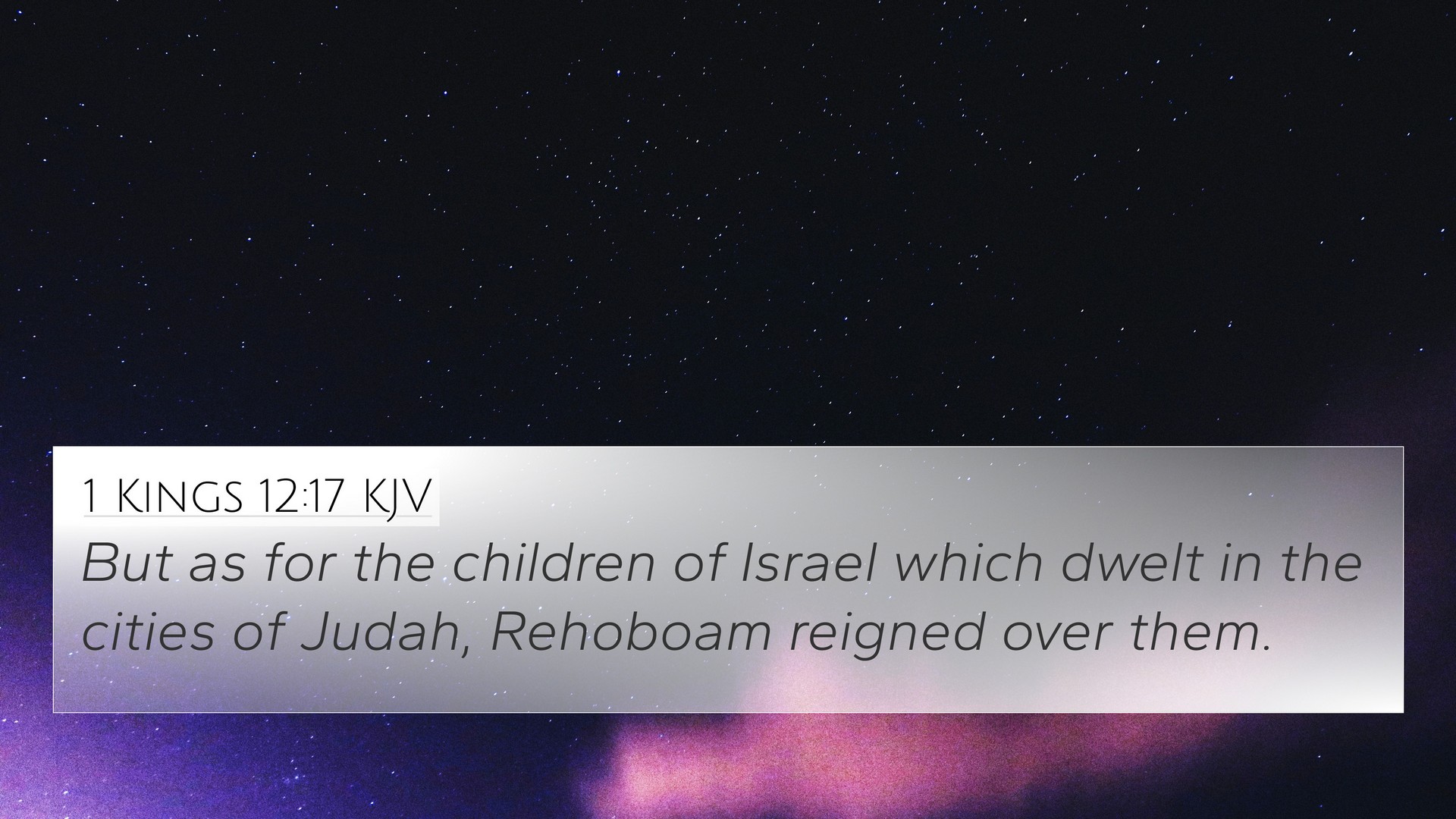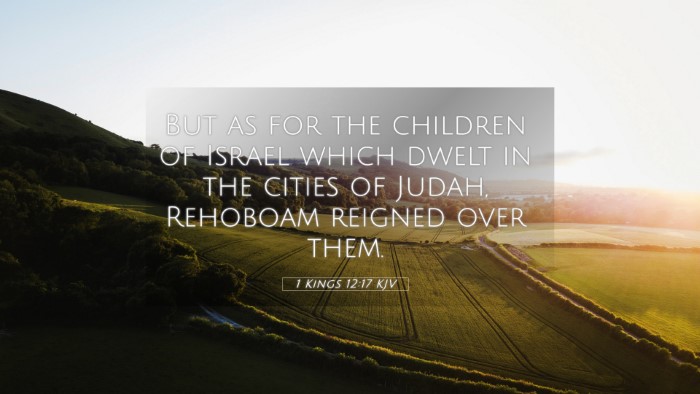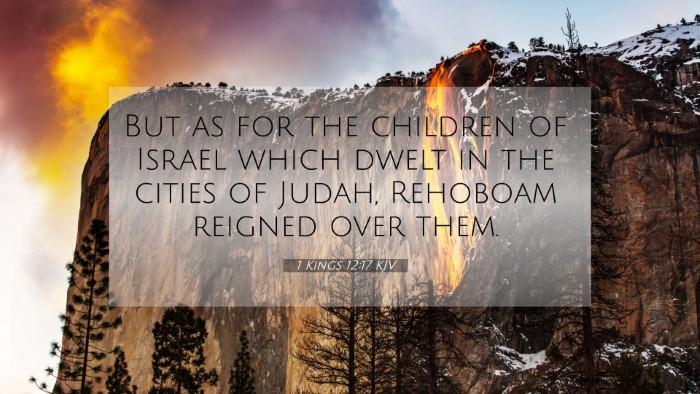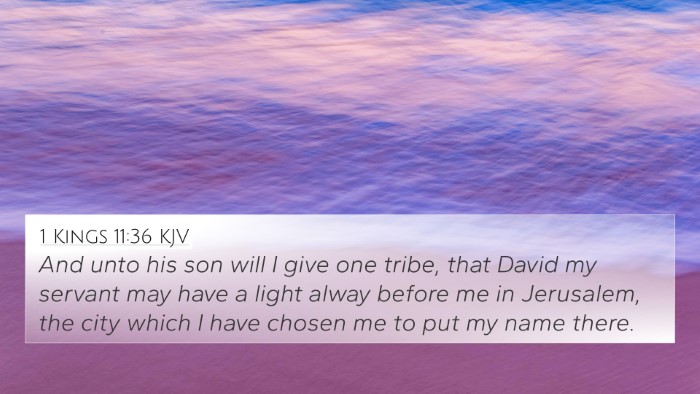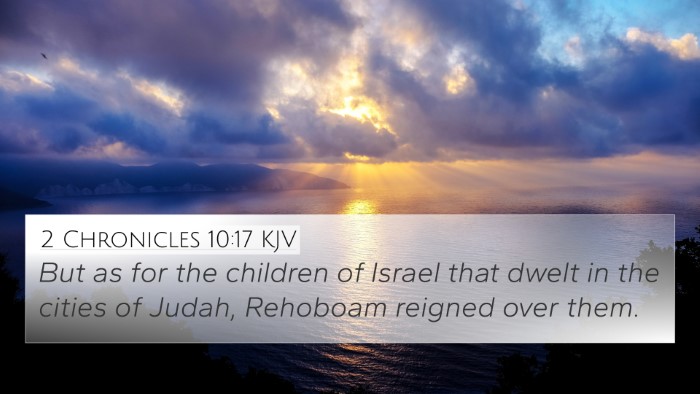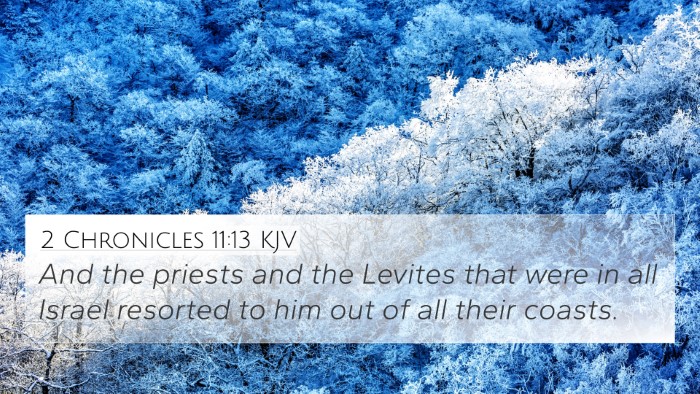Understanding 1 Kings 12:17
The verse 1 Kings 12:17 states:
"But as for the children of Israel which dwelt in the cities of Judah, Rehoboam reigned over them."
Context and Background
This verse occurs during a tumultuous time in Israel's history following the reign of Solomon. After Solomon's death, the kingdom was divided, and tensions rose between the northern tribes of Israel and the southern kingdom of Judah. Rehoboam's leadership and decisions were pivotal in shaping this division.
Insight from Public Domain Commentaries
-
Matthew Henry:
Henry emphasizes that the division of the kingdom was a significant event, foreshadowed by earlier prophecies. He explains that while Rehoboam reigned over Judah, he faced the challenge of maintaining loyalty from the tribes of Israel due to his heavy-handed policies. Matthew Henry highlights the importance of wise leadership and the consequences of turning a deaf ear to the people's grievances.
-
Albert Barnes:
Barnes provides a detailed analysis of Rehoboam’s reign, noting the division of the kingdom as a fulfillment of God's earlier promise to Jeroboam. He points out that Rehoboam's decision to forsake the advice of older, wiser counselors led to his inability to reign over all Israel, showcasing the necessity of prudent counsel in leadership decisions.
-
Adam Clarke:
Clarke discusses the political context of the time, highlighting the growing discontent among the northern tribes. He notes that Rehoboam's harsh rule may have been a critical factor in the loss of unity within Israel. His commentary points to the larger themes of authority and governance in the biblical narrative.
Thematic Analysis
This verse serves as a focal point for understanding themes of leadership, division, and the consequences of choices made by rulers.
-
Leadership: The consequences of Rehoboam's choices exemplify the importance of listening to wise counsel and being attentive to the needs of the people.
-
Division: This verse marks a pivotal moment in the division between Judah and Israel, signifying a deeper spiritual and political crisis.
Bible Cross-References
Several Bible verses provide context or draw parallels to 1 Kings 12:17. Here’s a list of relevant cross-references:
- 1 Kings 11:29-39: The prophecy concerning Jeroboam and the division of the kingdom.
- 2 Chronicles 10:1-19: A detailed account of Rehoboam's rebellion against the people’s request for lighter burdens.
- Proverbs 15:22: The wisdom of seeking counsel in decision-making situations.
- 1 Kings 12:1-16: The events leading up to the division and the response of the people to Rehoboam's harsh rule.
- Jeremiah 3:10: A prophetic reference to the faithlessness of Israel in relation to their leaders.
- Matthew 12:25: A New Testament parallel illustrating the principle that a kingdom divided against itself cannot stand.
- Romans 13:1: The biblical perspective on authority and governance, which underpins the nature of Rehoboam's leadership.
Exploring Connections Between Bible Verses
The events in 1 Kings 12:17 can be better understood by exploring connections between various Bible verses. These connections can offer insights into the broader narrative of division, governance, and divine guidance.
By examining the interactions and lessons learned from other scriptural passages, one can appreciate the depth of Rehoboam's story in the context of biblical principles of leadership and unity.
Tools for Bible Cross-Referencing
To enhance your study of cross-references and thematic connections in the Bible, consider utilizing the following tools:
- Bible Concordance: A tool that helps locate verses based on keywords.
- Bible Cross-Reference Guide: Resources that outline related scriptures.
- Bible Reference Resources: Various study Bibles and online resources that facilitate deeper understanding.
Conclusion
1 Kings 12:17 serves as a significant point of reflection within the biblical narrative concerning authority, accountability, and the repercussions of decisions made by leaders.
Through the insights gained from public domain commentaries and the thematic exploration of related scriptures, readers can garner a deeper understanding of the complexities surrounding Rehoboam's reign and the foundational principles of wise governance as illustrated throughout the Bible.
